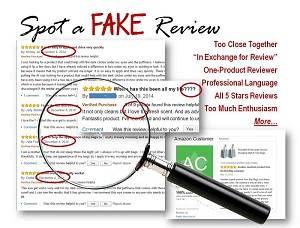FAKE REVIEWS: Customers buy, and have experiences with, a range of products and services.
Furthermore, they often provide a genuine assessment of its authenticity, usefulness, and practicality.
Hence, receiving realistic consumer reviews is a valuable type of customer feedback. But, the results can be positive – or negative.
In most cases, you will find online reviews written on websites used for e-commerce and for online shopping.
Appraisals and opinions fulfill an important role for gaining new customers. In fact, positive feedback often helps other purchasers decide whether to buy a particular product or service – or not!
In recent years, online review websites have become a fast growing industry. As a result, writing fake reviews is not difficult to achieve – at least in practice.
Moving on…
Some will hire online reputation management companies instead. They specialise in helping businesses repair the harm caused by negative online reviews.
But, fake negative reviews can damage a brand or an image. They also weaken consumer trust in online reviews and in review sites. Even worse, commissioning or creating fake Google reviews, for example, can result in civil or criminal action.
The True Picture of Online Reviews
 So the question is… are fake reviews illegal in the United Kingdom? The answer may come from the fact that the Competition and Markets Authority already tested the legalities.
So the question is… are fake reviews illegal in the United Kingdom? The answer may come from the fact that the Competition and Markets Authority already tested the legalities.
The CMA took action against an online marketing company caught posting fake business reviews on behalf of its clients.
As a business, there are several practices you must follow if your products are being reviewed:
- Unless you are a genuine customer you should not pretend to be one. Thus, do not write fake reviews about your own products (or those of a business you are not familiar with).
- Do not offer inducements to customers to write positive online reviews about your business (e.g. free gifts or a financial reward).
- It is not illegal to work with a third party (e.g. a marketing or PR company, or a Search Engine Optimisation agency). But, you should take steps to ensure they follow fake reviews rules.
- Commissioning third parties to write fake reviews on your behalf means you could actually be liable for their actions.
As a marketing agency, public relations (PR) representative, or SEO company, when working on behalf of another organisation, you should:
- Not be writing or arranging fake reviews for clients. You and the client risk breaking UK law on fake reviews. Thus, you may need to inform your clients that writing fake reviews is illegal in the United Kingdom.
- Make sure your staff members understand the requirements of the law. Your contracts, corporate brochures, and internal policies should also reflect the same.
Note: Research suggests more than half of adults in the UK will use some form of online reviews. Misleading consumers through reviews that you write or commission, may be breaking the law in the United Kingdom.
Consumer Protection from Unfair Trading
Further guidance is available to help traders comply with the Consumer Protection from Unfair Trading Regulations 2008 (CPRs).
Help and Information on Fake Reviews
- Business Companion (England)
- Consumer Protection Rights
Possible Consequences of Fake Reviews
The creation of fake online reviews continues to grow. Research also shows that actual business owners write a high proportion of them. Often, it is an act of despair after falling victim to fake online reviews themselves.
Nonetheless, the practice of writing fake reviews (also called ‘astroturfing’) is illegal in the United Kingdom. The law falls under the Consumer Protection from Unfair Trading Regulations 2008. This particular directive prohibits the undertaking of unfair commercial practices in Britain.
You’re probably wondering:
How does writing fake online reviews meet the definition of unfair commercial practices? In fact, it contravenes good professional practice. As a result, it is likely to distort the economic behaviour displayed by the average consumer.
Retailers who distort online reviews would be in breach of the CPUTR rules. In most cases, they would also break the laws on advertising codes.
The Office of Fair Trading (OFT) or Trading Standards can bring about prosecution for breaches of Unfair Trading Regulations. That said, the risk of getting caught remains quite low.
Related Help Guides
- Copycat website meaning: How to recognise copycats.
- Information Technology rules | What is IT all about?
- Website rules and regulations (functionality and privacy).
Note: The short video explains more about becoming Trading Standards approved through the ‘Buy With Confidence‘ scheme which promotes credibility and honesty.

